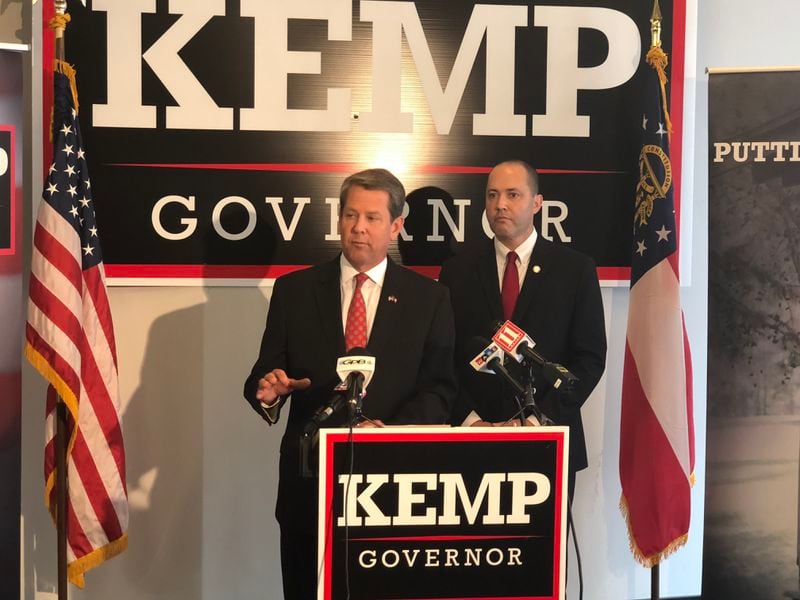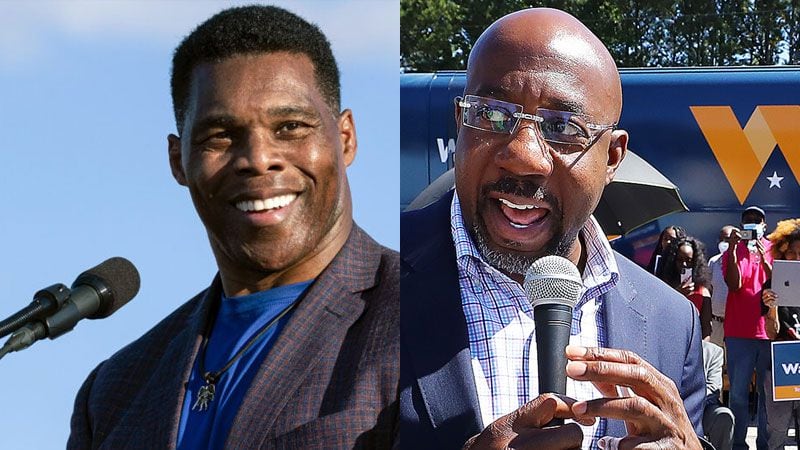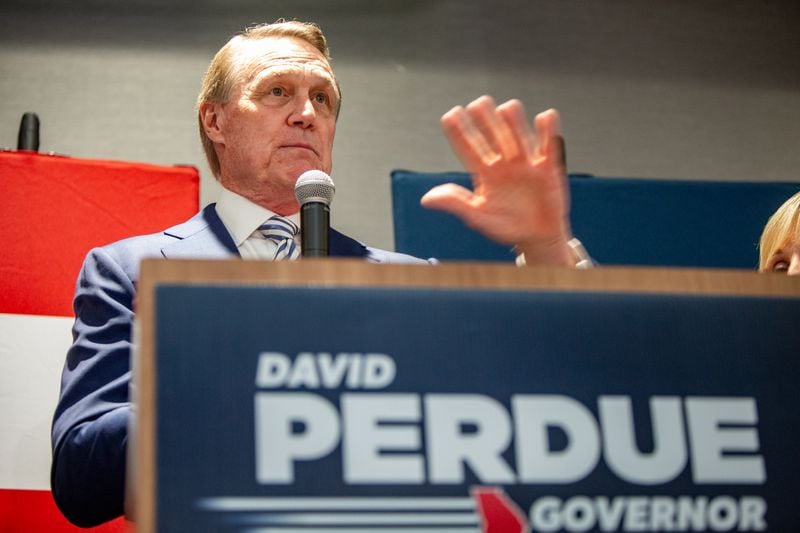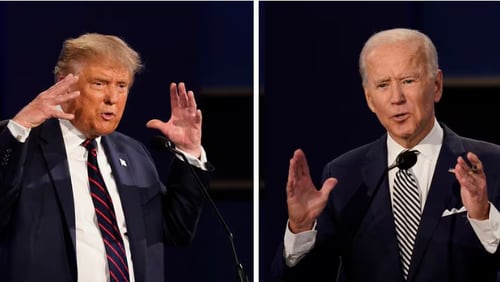Midterm record set for first-day turnout for early voting
Georgia voters set a record pace for a midterm on the first day of early voting, with more than 133,000 in-person voters casting ballots.
For a sense of scale, about 71,000 Georgians showed up on the first day of early voting in the 2018 midterms.
The hot pace means this year’s overall turnout will likely exceed the 3.9 million voters who cast ballots in 2018, although it will likely fall short of the 5 million Georgians who went to the polls for the 2020 presidential election.
Who voted may be more interesting.
An Atlanta Journal-Constitution analysis of election data shows that African Americans cast 39% of the ballots on the first day, even though they account for only 29% of the state’s population.
That could put to test University of Georgia political scientist Charles Bulloch’s “29-29″ theory that, in order for a Democrat to win a statewide race in Georgia, Black voters must make up at least 29% of the turnout. Such a Democrat, the theory goes, would also have to draw 29% of the white vote.
The formula used to be 30-30, but Bulloch recently wrote in The Washington Post that with the growing diversity of the state’s population, “29-29 suffices.”
This year, however, Democrats are not facing what might be called ideal laboratory conditions. The party of the president normally faces a battle during the midterms, and inflation’s position at the top of voters’ concerns only makes the fight more difficult.
Whites remain the leading demographic group, accounting for nearly half of the first day’s voters. Hispanic and Asian voters each accounted for about 1% of turnout. The remaining voters, about 9%, didn’t provide their race or chose “other” when they registered to vote.
In-person early voting remains Georgia’s most popular way to cast a ballot, with voting locations open for three weeks before Election Day, including two Saturdays. Some counties also offer voting on Sundays.
Other Georgians opt for absentee ballots, and they can apply for those ballots until Oct. 28. To count, they must be received by county election offices before polls close on Election Day on Nov. 8.
Voters can find their early voting locations, Election Day precincts, absentee ballot application forms and sample ballots on the My Voter Page at mvp.sos.ga.gov.
Barrage of ad spending could become a permanent condition in Georgia
With a race that could determine control of the U.S. Senate and a contest for governor featuring a pair of accomplished fundraisers, Georgia is the focus of heavy campaign advertising.
And that means hundreds of millions of dollars for television spots.
It’s a big year nationally for campaign advertising — the AdImpact tracker service estimates that broadcasters could take in nearly $5 billion for the midterm campaign cycle — and Georgia is responsible for a huge chunk of it.
More than $235 million has been spent or reserved, so far, for advertising in the state’s Senate race, media strategist Rick Dent said. More than $128 million is backing Democratic U.S. Sen. Raphael Warnock, and about $107 million has been devoted to electing his Republican opponent, Herschel Walker.
The race for governor isn’t quite that big, but it’s still substantial.
More than $58 million is going toward ads on the tube for Democrat Stacey Abrams. About $29 million has been spent or set aside on commercials backing Republican Gov. Brian Kemp. That’s more than either candidate raised during their first faceoff in 2018.
It’s turned into an arms race. The heavy amount of spending means candidates have to work harder so they can collect even more money to keep up with the other guy’s spending.
“We literally have fundraisers just about close to 6 1/2 days a week on average, all the way through the election,” Kemp said. “And we just have to have that funding to be able to operate everything we need to do to make sure that we win.”
Many of the commercials, especially at this stage in the election, fall under the heading of attack ads.
Some wonder how effective they are.
Anna Kottakis, a senior at Emory University, expressed frustration with the ads, especially repeated airings of allegations that Walker threatened violence against his ex-wife and other women.
“Not that it’s not important information for voters to know,” Kottakis said. “But it got to a point where (the ad) would come on and I would be like, ‘This is upsetting, I’m not paying attention to this.’ "
Georgians may have to get used to it. As a battleground state, Georgia will likely see even more ad spending during the 2024 presidential campaign.
But it could happen even sooner. Because the state requires runoffs in races where no candidate receives a majority of the votes, there’s a significant chance that some of this year’s contests will go into overtime. The advertising frenzy could intensify, especially if control of the Senate is once again Georgia’s decision to make.
That, GOP operative Mike Murphy said, would make the past few months of ads seem like an “Easter stroll.”
“Both parties are going to come rolling in there with clubs and dollars,” he said. “The state is going to be melted.”
Medicaid vendor that faces allegations of overbilling is a big donor to Carr, Kemp
When Georgia Attorney General Chris Carr starts working with a health insurer on a settlement involving billing and the state’s Medicaid program, he should have a good idea who he’s dealing with.
His reelection campaign has collected more than $70,000 in donations related to the company, St. Louis-based Centene Corp., most of that cash coming from executives in the firm.
Centene has already paid $485 million to 13 other states to settle allegations that it overbilled state Medicaid programs for prescription drug services.
The company, which has not admitted any wrongdoing, is now seeking settlements with nine other states, including Georgia.
Its affiliate, Peach State Health Plan, is one of three firms that share in the state’s annual pot of more than $4 billion to provide managed care to poor, disabled and elderly Georgians through Medicaid and PeachCare for Kids. Peach State Health Plan handles about 1 million cases.
In 2021, Centene set aside $1.25 billion to resolve settlements involving prescription medications in “affected states,” according to a July filing with the U.S. Securities and Exchange Commission.
Peach State Health Plan alerted state officials in January that the company “may have a remittance obligation” to the state Medicaid program concerning drug costs, according to an email Kaiser Health News obtained through a public records request.
Carr’s campaign said Georgians should not worry about the donations.
“All should understand the attorney general will vigorously defend his client — the people of Georgia — and handle every case before him legally, ethically and honestly,” Carr campaign manager Neil Bitting said.
Centene said in a statement that it donates to both Republicans and Democrats, generally supporting incumbents.
Those incumbents include Gov. Brian Kemp.
Records show Kemp’s reelection campaign has received more than $100,000 in contributions from Centene, its subsidiaries and its employees since 2018.
Kemp’s campaign declined to comment.
Carr’s and Kemp’s Democratic opponents have also received Centene-related money in the past.
State Sen. Jen Jordan, now running against Carr, received $1,500 from a Centene subsidiary in 2019 to support her reelection to the Georgia Senate. It has not given her any money this year.
Stacey Abrams, competing for a second time for governor against Kemp, has received $6,600 from a Centene subsidiary since 2015 through three separate donations. The last one came in October 2018, during that first run against Kemp.
William Perry, founder of Georgia Ethics Watchdogs, said state law does not bar candidates from accepting donations from companies such as Centene that do business with the state.
But he doesn’t like it.
“They’ll sit there and say they’ve done nothing unethical under the law, but if you come from an ethically moral position, it’s horrible,” Perry said. “It’s bad optics and it just really makes me sick.”
Credit: AJC file photos
Credit: AJC file photos
Hispanics gives Walker slight edge over Warnock in poll
Republican U.S. Senate hopeful Herschel Walker holds a slight lead over Democratic U.S. Sen. Raphael Warnock in a new poll of Hispanic voters.
The poll of 309 likely voters — all of whom self-identified as Hispanic or Latino — put Walker at 47% to Warnock’s 41%, just outside the margin of error of 5.6 percentage points. Libertarian Chase Oliver drew support from 11% of the respondents.
The poll was conducted Oct.11-12 by the University of Georgia’s School of Public and International Affairs. It was conducted in English and commissioned by the Georgia News Collaborative, a consortium that includes The Atlanta Journal-Constitution as a member.
The same poll shows Gov. Brian Kemp and Democrat Stacey Abrams in a tight contest. Abrams drew support from 49% of respondents, with 48% backing Kemp among Hispanics.
Respondents said the economy is their top issue.
Nearly 64% said high prices have had a “significant, negative impact” on their daily lives — more than the 54% of overall Georgia voters who responded to another recent Atlanta Journal-Constitution/Georgia News Collaborative poll. An additional 28% of Latino voters said inflation had a “noticeable” effect, and just 1% said it had no real impact.
That earlier poll of 1,030 likely voters, conducted Sept. 25-Oct. 4 and with a margin of error of 3.1 percentage points, showed Warnock leading Walker, 46% to 43%, with 4% backing Oliver. It also gave Kemp 51% to Abrams’ 41%.
Perdue sheds the last of his campaign funds
Former U.S. Sen. David Perdue closed the books on his federal campaign account and spread cash like it was Black Friday.
He took $3 million from the $4.3 million account to repay himself for loans he had made to his campaigns, according to a a federal financial disclosure.
The former Fortune 500 executive then started giving the rest to others.
Gov. Brian Kemp was one of the big beneficiaries, which might help heal wounds between the governor and Perdue following his challenge earlier this year in the GOP primary.
Not that Kemp was hurting too badly after trouncing Perdue by more than 50 percentage points.
The former senator gave $100,000 to the Georgians First Leadership Committee, which is controlled by Kemp’s campaign and is allowed to collect unlimited donations ahead of November’s election.
Perdue, who raised nearly $100 million during the 2020 U.S. Senate campaign that he lost in a runoff to Democrat Jon Ossoff, also gave:
- $500,000 to the National Victory Action Fund, a GOP group led by former U.S. Sen. Cory Gardner of Colorado.
- $100,000 to the National Republican Senatorial Committee, which pumped millions of dollars into his two campaigns for U.S. Senate.
- $75,000 to the Florida First Project, a super PAC backing U.S. Sen. Marco Rubio of Florida.
Credit: Screenshot
Credit: Screenshot
Taylor GOP chairwoman, husband plead guilty to Jan. 6 misdemeanors
Mandy Robinson-Hand, the chairwoman of the Taylor County Republican Party and a “county captain” for Herschel Walker’s U.S. Senate campaign, pleaded guilty to a misdemeanor charge related to her participation in the Jan. 6, 2021, riot at the U.S. Capitol.
So did her husband, Charles Hand III.
The two, who were not charged with a violent crime, admitted they illegally demonstrated inside the Capitol.
They are scheduled for sentencing Jan. 13 in U.S. District Court in Washington, and they face up to six months in prison.
Many similarly charged Jan. 6 defendants, after pleading guilty, have received sentences ranging from a few weeks in federal custody to probation.
The exceptions have been for those with prior convictions, which doesn’t help Robinson-Hand.
She received a five-year sentence in Taylor County on a drug charge for opiates in 2009, and she served four months behind bars, according to records from the Georgia Department of Corrections.
More top stories online
Here’s a sample of other stories about Georgia government and politics that can be found at www.ajc.com/politics/:
- Texts from Loeffler’s phone shed light on activities ahead of Jan. 6 and 2021 runoff
- Judge: Trump knew his Georgia voting fraud stats were inaccurate
- Herschel Walker embraces his badge controversy
- Georgia voters to consider four statewide ballot measures
- Georgia’s longest-serving congressman hopes to fight off GOP challenger
About the Author








/cloudfront-us-east-1.images.arcpublishing.com/ajc/NDZYIIBFHYFJ5LSGWANIXVGD5A.jpg)



